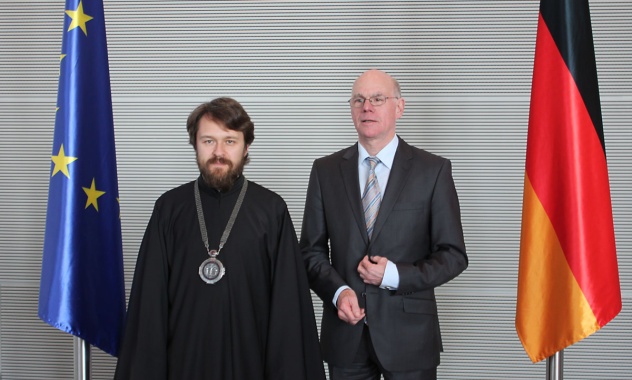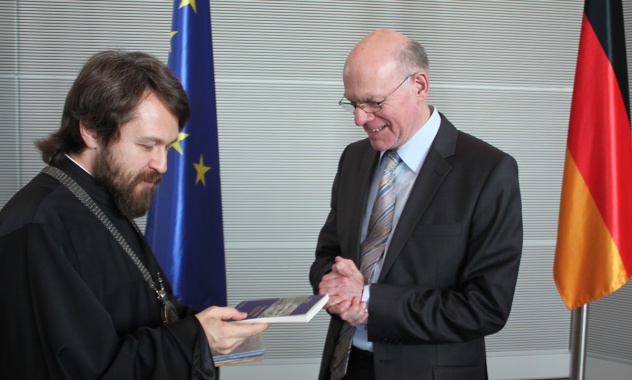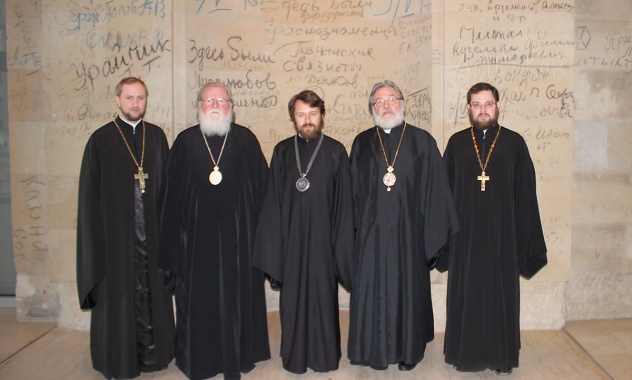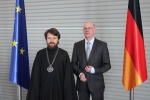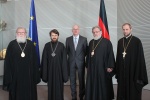Metropolitan Hilarion of Volokolamsk meets with the President of the Bundestag
On 25 April 2013, Metropolitan Hilarion of Volokolamsk, chairman of the Moscow Patriarchate’s Department for External Church Relations, visited the building of the German Parliament, where he met with the President of the Bundestag of the Federal Republic of Germany, Mr. Norbert Lammert.
Metropolitan Hilarion thanked Mr. Lammert for an opportunity to meet and exchange opinions. He told the President of the Bundestag about the purpose of his working visit to Germany, which was blessed by His Holiness Patriarch Kirill of Moscow and All Russia and was timed to the celebration of the centenary of St. Alexius Memorial Church in Leipzig and the Year of Russia in Germany and the Year of Germany in Russia.
Answering the question of Mr. Lammert, Metropolitan Hilarion told him about church-state relations in Russia today characteristic of mutual non-interference into internal affairs of each other, and also about inter-religious dialogue in the Russian Federation.
Metropolitan Hilarion agreed with the President of the Bundestag that Christians are the most persecuted religious group on the planet today, noted drastic deterioration of the situation of Christians in the Middle East and North Africa and underscored that a change of political regimes in certain countries of the region had resulted in the weakening or even disappearance of the mechanisms of control over the maintenance of inter-religious and inter-ethnic balance.
Metropolitan Hilarion paid a special attention to the dire situation in Syria, where the bishops of the Patriarchate of Antioch and the Syriac Orthodox Church were kidnapped several days ago. The reports of certain mass media are troublesome as they say that the kidnapped persons had been released while nothing is actually known about their destiny. The DECR chairman called for immediate elaboration of the mechanism of defending Christians in the countries of the Middle East and North Africa.
Metropolitan Hilarion drew Mr. Lammert’s attention to the problem of eroding spiritual, moral and family values in Europe. ‘We are against the inclusion of the same-sex unions to the notion of marriage,’ he underscored and expressed his hope that Germany would not follow the example of the European countries which have legalized homosexual unions and acknowledged the right of the same-sex couples to adopt children.
Taking part in the meeting were also Archbishop Feofan of Berlin and Germany; Archbishop Longin of Klin, representative of the Russian Orthodox Church in Germany; archpriest Sergiy Zvonarev, DECR secretary for far abroad countries; hegumen Daniel (Irbits), abbot of St. George’s monastery in Götschendorf and a member of the Committee for Integration at the Federal Chancellor of Germany; and Russian Embassy attaché, Mr. Tsvetkov, who acted as an interpreter.
After the meeting, Metropolitan Hilarion accompanied by church representatives had a tour of the Bundestag and saw graffiti left by Soviet soldiers after capture of the Reichstag in May 1945. Mr. Alexander Troche, head of protocol of the Bundestag, explained that the leaders of the German Parliament had taken necessary actions for restoration and preservation of graffiti. Many visitors come here and are introduced to the history of war and the experience of the past on which the growing generations are learning.
Other events
-
26.04.2013 18:30Metropolitan Hilarion of Volokolamsk completes his working visit to Germany
-
26.04.2013 14:30Metropolitan Hilarion of Volokolamsk meets with the President of the Bundestag
-
26.04.2013 12:00DECR chairman meets with the Head of the Royal House of Prussia
-
26.04.2013 10:33Metropolitan Hilarion met with Rainer Cardinal Woelki, Archbishop of Berlin
-
25.04.2013 11:36DECR chairman visits Leipzig
-
24.04.2013 15:04Metropolitan Hilarion meets with State Secretary of the German Ministry of Foreign Affairs
-
24.04.2013 00:55Metropolitan Hilarion of Volokolamsk arrives in Germany







